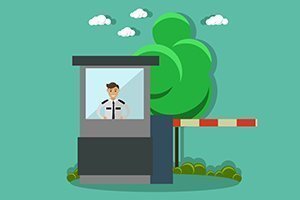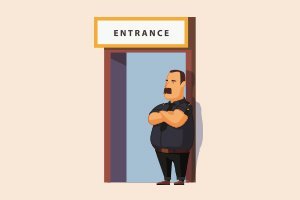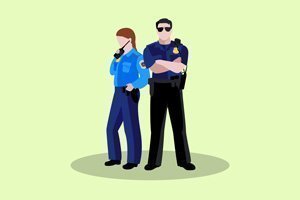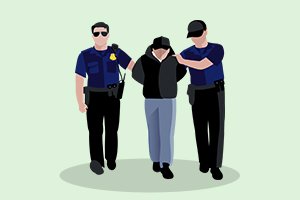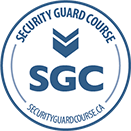Security guards play a crucial role in maintaining safety and order in a variety of settings. Be it retail, corporate, healthcare, or private events, their contributions are essential for protecting both people and property. Private security guards vastly outnumber police in Canada.
For example, as of March 2023 there were 132,419 licenced security guards and private investigators in Ontario. This is compared to only 26,215 police officers. It is well known that the public law enforcement system relies heavily on private security, who are often the first responders responsible for determining whether to involve police, as well as managing the situation until the police arrive.
Once on scene, police often look to the security guards present for further assistance. With so much responsibility, it is perfectly reasonable that security is not a good fit for everyone. It requires the right mindset, temperament, and skill set to succeed. This post focuses on what it takes to excel as a security guard, focusing on the qualities needed for success, the challenges that security guards face, and how the right aptitude and attitude can help overcome these challenges.
Key Qualities for Success
Being an effective security guard requires a combination of hard and soft skills, along with a professional mindset. The following are critical to a security guard’s success:
Temperament: A security guard’s temperament defines how they handle stress, conflict, and unpredictability, which are the realities of the role. Security guards must be able to remain calm under pressure, as emotional outbursts can escalate situations, lead to violence, and actions that could result in criminal or civil liability. For example, if a customer suddenly becomes verbally aggressive, the guard’s ability to maintain a calm demeanor can prevent further escalation, and allow the guard to assess and plan their approach in an objective-focused way.
Attitude: Having a positive and professional attitude is essential. Security guards regularly interact with the public, their coworkers, and law enforcement. Often, these are under stressful and uncomfortable circumstances. Their ability to remain professional, and focused on positive outcomes helps build trust and credibility with others. A security guard who approaches their work with dedication and professionalism is someone that others know they can turn to in times of trouble.
Observation Skills: The ability to observe and assess situations accurately is at the core of security work. Strong observation skills enable a guard to identify potential risks early, and take steps to mitigate them before they become serious issues. This requires focus, attention to detail, and the ability to process information quickly but accurately.
Communication Skills: Effective communication is essential for conflict prevention and de-escalation. It is also necessary for providing clear instructions, writing detailed reports, and articulating yourself verbally and in writing.
Flexibility: A security guard’s duties can vary drastically, and change suddenly. This requires the ability to quickly pivot and adapt to the issue at hand. A security guard may be assisting a customer to find their car in the parking lot, then suddenly observe an argument erupt over a parking spot, or a pedestrian may have been struck. A security guard must be flexible and adaptable enough to quickly shift their focus and attention to the necessities of each situation.
Challenges Security Guards Face (and How to Overcome Them)
It is in large part the qualities discussed above that allow security guards to overcome the many challenges that they will ultimately face. These challenges include:
Suspicion: Identifying threats early requires a healthy level of suspicion around people’s behavior. However, excessive suspicion can lead to distrust and conflict between the guard and those they are responsible for protecting. It can also lead to incorrect assessments, and poor decision-making. For example, if a security guard perceives every customer as a criminal, it can lead to poor customer service, which can lead to reputation damage, and strained relationships.
Solution: Self-awareness is the key to addressing many challenges. Be intentional about focusing on objective indicators of concern. Treat individuals respectfully until their actions give a clear reason for concern.
Negative Thinking: A big part of a security guard’s job is to look for things that are wrong, such as suspicious behavior, safety concerns, thefts, and property damage. With so much time spent being on the lookout for problems, it can be easy to fall into a habit of focusing on the negative. This mindset can lead to burnout, and hinder their ability to maintain positive relationships with others.
Solution: Find balance by recognizing and appreciating positive outcomes, such as preventing a theft from occurring, or peacefully resolving a conflict. Focus on the problem-solving process and ideal outcomes, rather than on the problems themselves.
Temperament: Some people struggle with self-regulation, managing anger, and composure when provoked. When this happens to a security guard, the consequences can be damaging to the guard’s reputation, as well as their employer’s, and lead to significantly worse outcomes.
Solution: Practice self awareness and stress management. Learn strategies such as deep breathing, positive self-talk, or stepping away momentarily when you’re being triggered. Training in Conflict Management and De-escalation can also provide practical strategies for maintaining self-control.
Prejudice and Discrimination: Like everyone, security guards may harbour unconscious biases based on past experiences, or personal beliefs. However, allowing prejudice to influence their decisions and actions is both unethical and unprofessional. Additionally, discriminating against someone because of their race, gender, religion, etc. could be violations of the Canadian Charter of Rights and Freedoms, or Human Rights Code (Ontario).
Solution: Commit to fairness and impartiality. Assess situations based on objective criteria like facts, policy, and best practices, rather than of assumptions or stereotypes. Diversity and/or sensitivity training can help reinforce this mindset.
Lack of Pride: An overall lack of pride in one’s work can manifest in a sloppy appearance, poor attitude, and lack of professional conduct. This undermines the credibility of the industry, and reflects poorly on not only the security guard, but on their employer as well.
Solution: Take pride in your role. If you find it difficult to do, it may be time to reevaluate whether you are in the right role, or with the right company. For the period of time that this is your role, take pride in your appearance, and how you interact with others.
Lack of Flexibility: Security guards must regularly switch between tasks, or quickly adjust to unexpected events. Guards who lack the flexibility to do this may struggle with the stress and uncertainty that results, which may prevent them from performing effectively in dynamic situations.
Solution: Embrace versatility as a strength, and actively work to improve. Take the opportunity to try new roles, and participate in regular training in all aspects of the job. This way you can prepare yourself for just about anything.
Abuse of Power: Security guards operate from a position of authority. However, there are many limits to these authorities and responsibilities. Misusing this authority, whether through unnecessary force, or unreasonable demands, can damage public trust, and lead to legal repercussions.
Solution: Clearly understand the scope of authority that applies to the role in any given situation, and exercise it with the goal of achieving a positive outcome. Always act within the boundaries of your legal authorities, company policies, and ethical standards.
Unable to Handle Criticism: Considering the role of security, and the nature of the situations they are involved in, criticism is inevitable. Not everyone will always be happy with the outcome. Security guards face potential complaints from the public, supervisors, and colleagues. Taking this criticism personally can negatively influence a guard’s attitude, and hinder personal growth.
Solution: Understand that criticism is inevitable, and an opportunity to learn and improve. Respond calmly, reflect on the feedback, and use the knowledge gained to improve your performance moving forward.
Building the Right Mindset
Success as a security guard is not just about avoiding mistakes, but intentionally cultivating a mindset focused on professional growth and resilience. Here are some strategies you can use to ensure you’re operating at your best:
Commit to Lifelong Learning: Keep up to date on industry best practices, technology, changes to the law, and other legislation. Actively develop your skills, and seek out opportunities to learn new things. This ongoing focus on growth and improvement will make you an asset to the industry.
Focus of Teamwork: Security work often involves collaboration. Building strong relationships with colleagues, and focusing on working together to meet expectations and achieving goals spreads the work across the team. Effective teams make the objectives their priority, and hold each other accountable. They are also there to support and encourage one another when the going gets tough.
Practice Self-Care: Security work can be physically and mentally taxing. It is important to prioritize your own well-being by getting plenty of rest, eating a healthy diet, getting regular exercise, and finding enjoyable activities to help manage stress.
Embrace Accountability: Take responsibility for yourself and your actions. When things go well, take pride in your accomplishments. When things go poorly, own it and use the experience to learn and grow. Being accountable for your mistakes shows maturity and integrity.
Conclusion
Being a successful security guard takes much more than just technical skills. Anyone can learn the fundamentals of security work, but it takes the right attitude, temperament and adaptability to truly shine in this crucial and challenging role. By focusing on professionalism, fairness, integrity, and continuous improvement, security guards can contribute to an environment where people and property are safe and well protected.
References:
Government of Canada (2024, April 16). The Canadian Charter of Rights and Freedoms. Retrieved January 14, 2025, from https://www.justice.gc.ca/eng/csj-sjc/rfc-dlc/ccrf-ccdl/
Government of Ontario (2024, December 18). Human Rights Code, R.S.O. 1990, c. H.19. E-Laws. Retrieved January 14, 2025, from https://www.ontario.ca/laws/statute/90h19
Government of Ontario (n.d.). Private Security and Investigative Services Branch Read the report and learn about milestones and accomplishments during 2022–2023. Ontario.ca. Retrieved January 14, 2025, from https://www.ontario.ca/page/private-security-and-investigative-services-branch#section-4
Statista (2024, March 1). Number of police officers in Canada in 2023, by province or territory. Retrieved January 14, 2025, from https://www.statista.com/statistics/530608/number-of-police-officers-in-canada-by-province/

